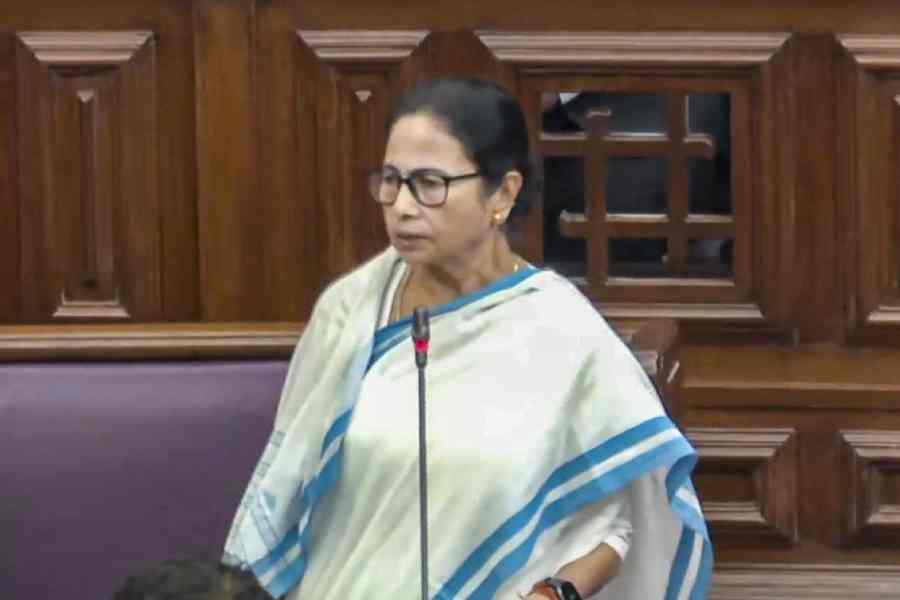Mamata Banerjee on Monday questioned the Narendra Modi government’s “silence for the last 10 days” despite the chaos and violence in Bangladesh before suggesting the Centre approach the United Nations for the deployment of peacekeeping forces in the neighbouring country.
The Bengal chief minister’s suggestion and her remarks on the attacks on Hindus drew sharp reactions from various quarters in Bangladesh.
“We condemn atrocities of any kind, irrespective of caste, creed and religion. I also suggest that the UN send a peacekeeping team to Bangladesh. Either the Prime Minister or the external affairs minister should engage with Bangladesh,” Mamata said at the Bengal Assembly.
She went on to accuse the Centre of “silence for the last 10 days”.
Mamata’s comments were clearly aimed at countering the BJP’s efforts to exploit the Bangladesh developments to polarise Bengal’s voters, with Trinamool’s alleged Muslim appeasement featuring prominently in the saffron discourse.
Within hours, Md Touhid Hossain, foreign policy adviser to the Muhammad Yunus-led interim government, described Mamata’s remarks as “typical of her” in an apparent attempt to downplay her concerns.
“I see Mamata Banerjee’s statement as typical of her. I do not understand why she made this statement,” Hossain said, recalling his familiarity with the Trinamool chief during his stint at the Bangladesh deputy high commission in Calcutta.
“Politicians often make statements from a political perspective. I believe this will probably help her in West Bengal politics, but that is my view,” the former Bangladesh foreign secretary said.
Hossain had earlier in the day met foreign diplomats in Dhaka to brief them about the condition of minorities in the country.
The interim regime’s commitment to preserving the secular fabric of Bangladesh has come under the scanner in recent months following reports of a spate of attacks on minorities since Sheikh Hasina’s ouster on August 5.
The sense of insecurity that the violence has engendered among the more than 2 crore Hindus, Christians and Buddhists in the country has escalated further following the arrest of Hindu monk Chinmoy Krishna Das on sedition charges on November 25.
Protests by Hindus against the arrest were allegedly quashed in a highhanded manner, and a clamour is growing for a ban on Iskcon, with which Das was previously associated.
Organisations like the Hindu-Christian-Buddhist Unity Council have complained that cadres of the Hefazat-e-Islam and the Hizb-ut Tahrir are terrorising the minorities.
The alleged atrocities on minorities, especially Hindus, have become a politically sensitive issue in India with the BJP upping the ante against the Yunus regime, creating a narrative against Muslims and holding programmes to “unite Hindus” this side of
the border.
Multiple saffron camp insiders have told this newspaper that the BJP leadership sees in the Bangladesh situation an opportunity to crank up its polarisation agenda in Bengal as part of its preparations for the 2026 Assembly polls.
A senior BJP leader said the party’s electoral success in Bengal would depend critically on its ability to polarise the voters along Hindu-Muslim lines.
“The Bangladesh developments helped us even in Maharashtra.... It will surely yield dividends for us as the situation worsens further beyond the border,” the politician said.
While trying to counter the BJP narrative, Mamata sent out a message of inclusiveness, saying she was willing to rehabilitate those persecuted in Bangladesh and emphasising the importance of communal harmony in the neighbouring country.
She then went a step further and broached the subject of a UN peacekeeping force, which a former Indian diplomat described as “unnecessary” in the present context.
A source close to Mamata suggested that by questioning the Centre’s “silence for the last 10 days”, the chief minister was “probably trying to prod the BJP-led Centre to act instead of talking”.
The Bangladesh Nationalist Party (BNP), which has been lending support to the Yunus regime despite some differences, reacted strongly to Mamata’s remarks and demanded their immediate withdrawal.
“The statement made by Mamata Banerjee about sending peacekeeping forces to Bangladesh is entirely a threat to the country’s independence and sovereignty.... I believe Mamata Banerjee should immediately withdraw her statement. Such thoughts should not even exist,” BNP secretary-general Mirza Fakhrul Islam Alamgir said in an audio statement from London.
While the regime in Bangladesh and its supporters are upset at Mamata’s remarks, a source in Hasina’s Awami League, which governed the country for the last 16 years, said the Bengal chief minister’s comments had exposed the reality in today’s Bangladesh.
“There is an absolute breakdown of law and order under Yunus.... Ordinary people in the country are tired of this inefficient regime and their voices are reaching beyond the borders. The world community must take note of what’s happening in Bangladesh,” a former MP, who is in hiding, said.
That the reports about law-and-order deterioration and the attacks on minorities, dissenters and journalists have become an embarrassment for the Yunus regime became clear when Hossain met the diplomatic corps in Dhaka in the afternoon and accused segments of “the media” and “vested interest groups” of spreading misinformation.
This narrative of the interim government, an academic in Dhaka said, has been stoking anti-India sentiments that, in turn, are triggering attacks on the minorities.
“The government should act against those behind the earlier attacks on the minorities. It should ensure a fair and transparent trial for Das, whose bail petition will again come up on Tuesday. Only concrete measures can save the government’s credibility,” the academic said.
India’s external affairs ministry said the government was stepping up security at the Bangladesh high commission in New Delhi and the neighbouring country’s consular offices in India following an attack on the assistant high commission in Agartala.
“The incident earlier today of the breach of premises at the Bangladesh assistant high commission in Agartala is deeply regrettable,” the ministry statement said.











